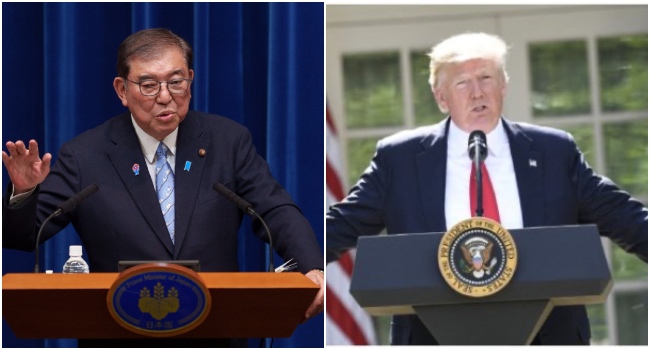
Japanese Prime Minister Shigeru Ishiba on Friday described the United States’ new tariffs on Japanese goods as a “national crisis,” underscoring the growing economic tensions ahead of cross-party talks aimed at easing the fallout.
The comments came a day after U.S. President Donald Trump announced a steep 24% tariff on Japanese imports — part of a broader set of “reciprocal” levies targeting key trading partners. Despite Japan being the largest investor in the U.S., the measures also include a 25% duty on automobile imports, which took effect earlier this week.
Speaking in parliament, Ishiba emphasized the seriousness of the situation, saying the government was working with all political parties to address the economic risks. He also urged a “calm and measured” approach to negotiations with the U.S. administration.
Bank of Japan Governor Kazuo Ueda weighed in, warning that the tariffs could place downward pressure on both the Japanese and global economies.
To cushion the impact, Ishiba directed his ministers to closely assess the implications of the tariffs and prepare a full range of support measures, including financial assistance for domestic industries and job protection. Government spokesperson Yoshimasa Hayashi said the cabinet is also considering provisions in a supplementary budget, which will require bipartisan backing to pass.
Hayashi reiterated Tokyo’s disappointment over the U.S. move, calling it “extremely regrettable,” and said Japan holds “serious concerns” about the legality of the tariffs under World Trade Organization rules and existing bilateral trade agreements.
The economic strain was reflected in the markets, as Japan’s Nikkei 225 index dropped over 3% on Friday, following a 2.7% fall the previous day, mirroring steep declines on Wall Street.
Business leaders voiced deep concern. The Japan Chamber of Commerce and Industry (JCCI) said the tariffs could have “an extremely grave impact” on Japan’s economy. The group urged the government to intensify its negotiations with Washington and offer targeted relief for small and medium-sized businesses, including consultations and financial support.
The Japan Automobile Manufacturers Association (JAMA), representing one of the country’s most vital sectors, called for a comprehensive package to sustain the industry’s domestic base. JAMA stressed the need for reform of Japan’s auto-related tax system and broader support to help revitalize the local market.
JAMA highlighted that Japanese automakers have invested over $66 billion in U.S. manufacturing facilities as of 2024, directly employing more than 110,000 Americans and supporting over 2.2 million related jobs.
“We have long believed that deep integration into the U.S. auto industry through local investment and job creation is the most sustainable path forward,” JAMA said.
According to Bloomberg, Japanese carmakers currently export around 1.45 million vehicles to the U.S. from Canada and Mexico, and an additional 1.49 million directly from Japan. Japanese manufacturers also produce about 3.3 million vehicles annually within the United States.
With the auto industry employing roughly 5.6 million people in Japan and making up nearly 28% of its ¥21.3 trillion ($142 billion) worth of U.S.-bound exports last year, the stakes could hardly be higher.
